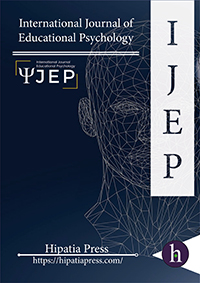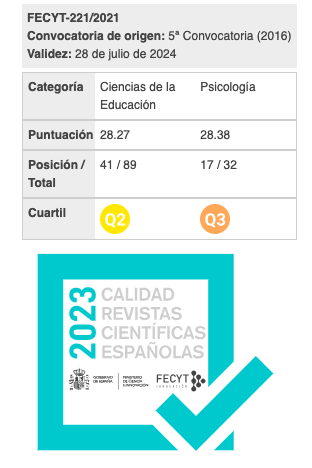Procrastination, self-esteem, academic performance, and well-being: A moderated mediation model
Keywords:
Downloads
Abstract
The current study attempts to provide a more detailed investigation regarding the effects of procrastination on well-being in a sample of Turkish undergraduate students (N = 348). Results confirm prior evidence suggesting that procrastination and self-esteem were important predictors of well-being. Results also indicated that both procrastination and academic performance have direct and interactive effects on self-esteem. Self-esteem mediated the relationships between procrastination and well-being. Furthermore, the indirect effect of procrastination on well-being via mediation of self-esteem may vary depending on academic performance. Findings were discussed in terms of related literature and further suggestions have been made for future studies.
Downloads
References
Alves-Martins, M., Peixoto, F., Gouveia-Pereira, M., Amaral, V., & Pedro, I. (2002). Self-esteem and academic achievement among adolescents. Educational Psychology, 22(1), 51-62.
Google Scholar CrossrefBalkis, M. (2013). Academic procrastination, academic life satisfaction and academic achievement: The mediation role of rational beliefs about studying. Journal of Cognitive and Behavioral Psychotherapies, 13(1), 57-74.
Google Scholar CrossrefBalkis, M., & Duru, E. (2016). Procrastination, self-regulation failure, academic life satisfaction, and affective well-being: underregulation or misregulation form. European Journal of Psychology of Education, 31(3), 439 – 459.doi:10.1007/s10212-015-0266-5
Google Scholar CrossrefBalkis, M. & Duru, E. (2012). The direct and indirect role of self-esteem and procrastination in the relation to fear of failure and self-worth. International Journal of Human Sciences, 9 (2), 1075-1093.
Google Scholar CrossrefBalkis, M., & Duru, E. (2009). Prevalence of academic procrastination behavior among preservice teachers, and its relationships with demographics and individual preferences. Journal of Theory and Practice in Education, 5(1), 18-32.
Google Scholar CrossrefBajaj, B., Gupta, R., & Pande, N. (2016). Self-esteem mediates the relationship between mindfulness and well-being. Personality and Individual Differences, 94, 96-100. doi:10.1016/j.paid.2016.01.020
Google Scholar CrossrefBaumeister, R. F., Campbell, J. D., Krueger, J. I., & Vohs, K. D. (2003). Does high self-esteem cause better performance, interpersonal success, happiness, or healthier lifestyles? Psychological Science in the Public Interest, 4(1), 1-44. doi: 10.1111/1529-1006.01431
Google Scholar CrossrefBowles, T. (1999). Focusing on time orientation to explain adolescent self-concept and academic achievement. Journal of Applied Health Behavior, 1, 1-8.
Google Scholar CrossrefBurka, J. B., & Yuen, L. M. (2008). Procrastination: Why you do it, what to do about it. Cambridge: Da Capo Press,
Google Scholar CrossrefChapman, J. W. (1988). Learning disabled children’s self-concepts. Review of Educational Research, 58(3), 347-371. doi: 10.3102/00346543058003347
Google Scholar CrossrefCovington, M.V. (2007). A motivational analysis of academic life in college. In R.P. Perry and J.C. Smart (Ed.), The Scholarship of Teaching and Learning in Higher Education: An Evidence-Based Perspective (661-729). Dordrecht: Springer.
Google Scholar CrossrefCuhadaroglu, F. (1986). Self-esteem in adolescents. Unpublished doctoral dissertation, Hacettepe University, Turkey.
Google Scholar CrossrefDiener, E., & Diener, M. (2009). Cross-cultural correlates of life satisfaction and self-esteem. In Culture and well-being (pp. 71-91). Springer Netherlands.
Google Scholar CrossrefDuru, E., & Balkis, M. (2014). The roles of academic procrastination tendency on the relationships among self-doubt, self-esteem, and academic achievement. Education and Sciences, 39 (173), 274-287.
Google Scholar CrossrefFernie, B. A., McKenzie, A. M., Nikčević, A. V., Caselli, G., & Spada, M. M. (2016). The contribution of metacognitions and attentional control to decisional procrastination. Journal of Rational-Emotive & Cognitive-Behavior Therapy, 34(1), 1-13.doi: 10.1007/s10942-015-0222-y
Google Scholar CrossrefFerrari, J. R. (2000). Procrastination and attention: Factor analysis of attention deficit, boredomness, intelligence, self-esteem, and task delay frequencies. Journal of Social Behavior and Personality, 15(5), 185-196.
Google Scholar CrossrefFerrari, J. R., & Díaz-Morales, J. F. (2007). Perceptions of self-concept and self-presentation by procrastinators: Further evidence. Spanish Journal of Psychology, 10(1), 91-96. doi: 10.1017/S113874160000634X
Google Scholar CrossrefFerrari, J. R., Johnson, J. L., &. McCown, W.G. (Eds) (1995) Procrastination and task avoidance: Theory, research, and treatment. New York: Plenum Press.
Google Scholar CrossrefFerrari, J. R. (1991). Self-handicapping by procrastinators: Protecting self-esteem, social-esteem, or both? Journal of Research in Personality, 25(3), 245-261. doi:10.1016/0092-6566(91)90018-L
Google Scholar CrossrefFilozof, E. M., Albertin, H. K., Jones, C. R., Steme, S. S., Myers, L., & McDermott, R. J. (1998). Relationship of adolescent self‐esteem to selected academic variables. Journal of School Health, 68(2), 68-72. doi: 10.1111/j.1746-1561.1998.tb07194.x
Google Scholar CrossrefGagnon, J., Dionne, F., & Pychyl, T. A. (2016). Committed action: An initial study on its association to procrastination in academic settings. Journal of Contextual Behavioral Science, 5(2), 97-102.doi:10.1016/j.jcbs.2016.04.002
Google Scholar CrossrefGençöz, T. (2000). Pozitif ve negatif duygu ölçeği: Geçerlik ve güvenirlik çalışması. Türk Psikoloji Dergisi, 15(46), 19-26.
Google Scholar CrossrefGrunschel, C., Schwinger, M., Steinmayr, R., & Fries, S. (2016). Effects of using motivational regulation strategies on students' academic procrastination, academic performance, and well-being. Learning and Individual Differences, 49, 162-170. doi:10.1016/j.lindif.2016.06.008
Google Scholar CrossrefHarriott, J., & Ferrari, J. R. (1996). Prevalence of procrastination among samples of adults. Psychological Reports, 78(2), 611-616. doi: 10.2466/pr0.1996.78.2.611
Google Scholar CrossrefHansford, B. C., & Hattie, J. A. (1982). The relationship between self and achievement/performance measures. Review of Educational Research, 52(1), 123-142. doi: 10.3102/00346543052001123
Google Scholar CrossrefHayes, A. F. (2013). Introduction to mediation, moderation, and conditional process analysis. A regression-based approach. New York, NY: Guilford.
Google Scholar CrossrefHinsch, C., & Sheldon, K. M. (2013). The impact of frequent social internet consumption: Increased procrastination and lower life satisfaction. Journal of Consumer Behavior, 12(6), 496-505. doi:10.1002/cb.1453
Google Scholar CrossrefHoge, D. R., Smit, E. K., & Crist, J. T. (1995). Reciprocal effects of self-concept and academic achievement in sixth and seventh grade. Journal of Youth and Adolescence, 24(3), 295-314. doi:10.1007/BF01537598
Google Scholar CrossrefJackson, T., Weiss, K. E., Lundquist, J. J., & Hooper, D. (2003). The impact of hope, procrastination, and social activity on academic performance of Midwestern college students. Education, 124(2), 310-320.
Google Scholar CrossrefKim, K. R., & Seo, E. H. (2015). The relationship between procrastination and academic performance: A meta-analysis. Personality and Individual Differences, 82, 28-33. doi:10.1016/j.paid.2015.02.038.
Google Scholar CrossrefKlassen, R. M., & Kuzucu, E. (2009). Academic procrastination and motivation of adolescents in Turkey. Educational Psychology, 29(1), 69-81. doi: 10.1080/01443410802478622
Google Scholar CrossrefLeary, M. R. (2005). Sociometer theory and the pursuit of relational value: Getting to the root of self-esteem. European Review of Social Psychology, 16(1), 75-111. doi: 10.1080/10463280540000007
Google Scholar CrossrefLin, C. C. (2015). Self-esteem mediates the relationship between dispositional gratitude and well-being. Personality and Individual Differences, 85, 145-148. doi:10.1016/j.paid.2015.04.045
Google Scholar CrossrefMäkikangas, A., Kinnunen, U., & Feldt, T. (2004). Self-esteem, dispositional optimism, and health: Evidence from cross-lagged data on employees. Journal of Research in Personality, 38(6), 556-575. doi:10.1016/j.jrp.2004.02.001
Google Scholar CrossrefMarsh, H. W., Byrne, B. M., & Shavelson, R. J. (1988). A multifaceted academic self-concept: Its hierarchical structure and its relation to academic achievement. Journal of Educational Psychology, 80(3), 366-380. doi: 10.1037/0022-0663.80.3.366
Google Scholar CrossrefMilgram, N., & Toubiana, Y. (1999). Academic anxiety, academic procrastination, and parental involvement in students and their parents. British Journal of Educational Psychology, 69(3), 345-361. doi: 10.1348/000709999157761
Google Scholar CrossrefOsborne, J. W. (1997). Race and academic disidentification. Journal of Educational Psychology, 89(4), 728-735. doi: 10.1037/0022-0663.89.4.728
Google Scholar CrossrefOzer, B.U., O'Callaghan, J., Bokszczanin, A., Ederer, E., & Essau, C. (2014). Dynamic interplay of depression, perfectionism and self-regulation on procrastination. British Journal of Guidance & Counselling, 42, 309–319. doi:10.1080/03069885.2014.896454
Google Scholar CrossrefÖzer, B.U., Saçkes, M., & Tuckman, W. B. (2013). Psychometric properties of the Tuckman procrastination scale in a Turkish Sample. Psychological Reports, 113(3), 874-884. doi: 10.2466/03.20.PR0.113x28z7
Google Scholar CrossrefÖzer, B. U., Demir, A., & Ferrari, J. R. (2009). Exploring academic procrastination among Turkish students: Possible gender differences in prevalence and reasons. The Journal of Social Psychology, 149(2), 241-257. doi: 10.3200/SOCP.149.2.241-257
Google Scholar CrossrefPark, S.W., & Sperling, R.A.(2012). Academic procrastinator and their self-regulation. Psychology in Scientific Research, 3(1), 12-23. doi:10,4236/psych.2012,31003
Google Scholar CrossrefPullmann, H., & Allik, J. (2008). Relations of academic and general self-esteem to school achievement. Personality and Individual Differences, 45(6), 559-564. doi:10.1016/j.paid.2008.06.017
Google Scholar CrossrefPychyl, T. A., Coplan, R. J., & Reid, P. A. (2002). Parenting and procrastination: gender differences in the relations between procrastination, parenting style and self-worth in early adolescence. Personality and Individual Differences, 33, 271–285. doi:10.1016/S0191-8869(01)00151-9
Google Scholar CrossrefPyszczynski, T., Greenberg, J., Solomon, S., Arndt, J., & Schimel, J. (2004). Why do people need self-esteem? A theoretical and empirical review. Psychological Bulletin, 130(3), 435-468. doi: 10.1037/0033-2909.130.3.435
Google Scholar CrossrefRichardson, M., Abraham, C. & Bond, R. (2012). Psychological correlates of university students’ academic performance: A systematic review and meta-analysis. Psychological Bulletin, 138, 353–387. doi:10.1037/a0026838.
Google Scholar CrossrefRosenberg, M. (1965). Society and the adolescent self-image. Princeton, NJ: Princeton University Press.
Google Scholar CrossrefSchmitt, N., Oswald, F. L., Friede, A., Imus, A., & Merritt, S. (2008). Perceived fit with an academic environment: Attitudinal and behavioral outcomes. Journal of Vocational Behavior, 72(3), 317-335. doi: 10.1177/1069072712466713
Google Scholar CrossrefSirois, F. M. & Tosti, N. (2012). Lost in the moment? An investigation of procrastination, mindfulness, and well-being. Journal of Rational-Emotive & Cognitive-Behavior Therapy, 30, 237–248. doi: 10.1007/s10942-012-0151-y
Google Scholar CrossrefSmokowski, P. R., Guo, S., Rose, R., Evans, C. B., Cotter, K. L., & Bacallao, M. (2014). Multilevel risk factors and developmental assets for internalizing symptoms and self-esteem in disadvantaged adolescents: Modeling longitudinal trajectories from the Rural Adaptation Project. Development and Psychopathology, 26(4pt2), 1495-1513. doi: 10.1017/S0954579414001163
Google Scholar CrossrefSowislo, J. F., & Orth, U. (2013). Does low self-esteem predict depression and anxiety? A meta-analysis of longitudinal studies. Psychological Bulletin, 139(1), 213-240. doi: 10.1037/a0028931
Google Scholar CrossrefStead, R., Shanahan, M. J., & Neufeld, R. W. (2010). “I’ll go to therapy, eventually”: Procrastination, stress and mental health. Personality and Individual Differences, 49(3), 175-180. doi: 10.1016/j.paid.2010.03.028
Google Scholar CrossrefSteel, P. (2010). Arousal, avoidant and decisional procrastinators: Do they exist? Personality and Individual Differences, 48, 926-934. doi:10.1016/j.paid.2010.02.025
Google Scholar CrossrefSteel, P. (2007). The nature of procrastination: A meta-analytic and theoretical review of quintessential self-regulatory failure. Psychological Bulletin, 133, 65-94. doi:10.1037/0033-2909.133.1.65
Google Scholar CrossrefStupnisky, R. H., Renaud, R. D., Perry, R. P., Ruthig, J. C., Haynes, T. L., & Clifton, R. A. (2007). Comparing self-esteem and perceived control as predictors of first-year college students’ academic achievement. Social Psychology of Education, 10(3), 303-330. doi: 10.1007/s11218-007-9020-4
Google Scholar CrossrefSuk Wai Wong, M., & Watkins, D. (2001). Self-esteem and ability grouping: A Hong Kong investigation of the big fish little pond effect. Educational Psychology, 21(1), 79-87. doi: 10.1080/01443410123082
Google Scholar CrossrefSymister, P., & Friend, R. (2003). The influence of social support and problematic support on optimism and depression in chronic illness: a prospective study evaluating self-esteem as a mediator. Health Psychology, 22(2), 123-129. doi: 10.1037/0278-6133.22.2.123
Google Scholar CrossrefThompson, T. (1999). Underachieving to protect self-worth: Theory, research, and interventions. Aldershot, England: Ashgate Publishing Ltd.
Google Scholar CrossrefTice, D. M., & Baumeister, R. F. (1997). Longitudinal study of procrastination, performance, stress, and health: The costs and benefits of dawdling. Psychological Science, 8(6), 454- 458. doi:10.1111/j.1467-9280.1997.tb00460.x
Google Scholar CrossrefTuckman, B. W. (1991). The development and concurrent validity of the procrastination scale. Educational & Psychological Measurement, 51, 473-481. doi:10.1177/0013164491512022.
Google Scholar CrossrefWatson, D., Clark, L. A., & Tellegen, A. (1988). Development and validation of brief measures of positive and negative affect: the PANAS scales. Journal of Personality and Social Psychology, 54(6), 1063-1070. doi: 10.1037/0022-3514.54.6.1063
Google Scholar CrossrefWhitesell, N. R., Mitchell, C. M., & Spicer, P. (2009). A longitudinal study of self-esteem, cultural identity, and academic success among American Indian adolescents. Cultural Diversity and Ethnic Minority Psychology, 15(1), 38-50.doi:10.1037/a0013456
Google Scholar CrossrefWood, J. V., Heimpel, S. A., & Michela, J. L. (2003). Savoring versus dampening: self-esteem differences in regulating positive affect. Journal of Personality and Social Psychology, 85(3), 566-580. doi: 10.1037/0022-3514.85.3.566
Google Scholar Crossrefvan Eerde, W. (2003). Procrastination at work and time management training. Journal of Psychology, 137, 421-434. doi:/10.1080/00223980309600625
Google Scholar CrossrefDownloads
Published
Almetric
Dimensions
How to Cite
Issue
Section
License
All articles are published under Creative Commons copyright (CC BY). Authors hold the copyright and retain publishing rights without restrictions, but authors allow anyone to download, reuse, reprint, modify, distribute, and/or copy articles as the original source is cited.
















